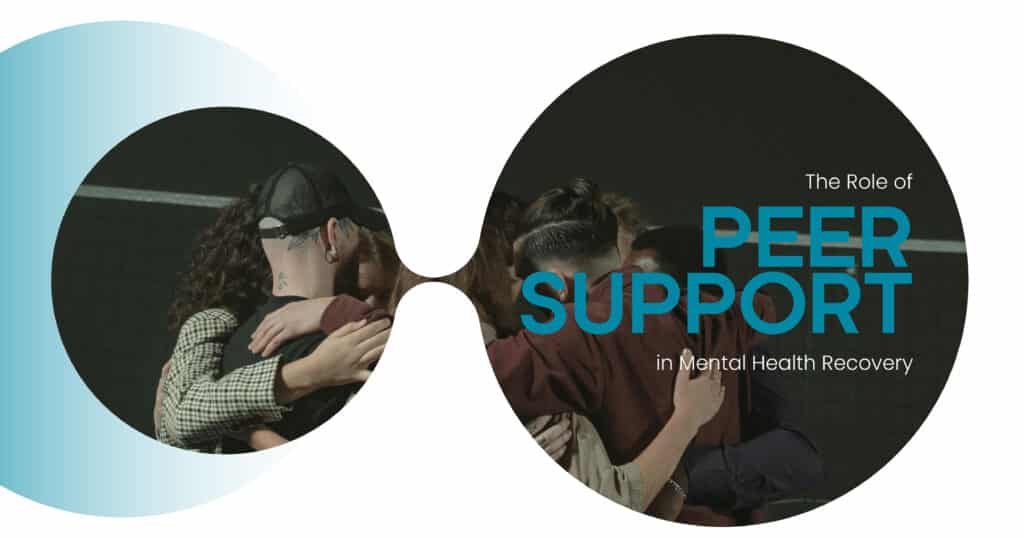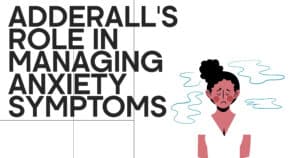A successful mental health recovery process requires compassion, understanding, and a variety of support systems. Peer support, though often forgotten, is a necessary aspect of mental health recovery. It is important to help people navigate the changes seen in the recovery journey through emotional support, shared experiences, and practical advice.
In this blog post, we will discuss peer support in mental health, different forms of peer support, the benefits of peer support, and how to implement peer support in your mental health recovery journey. Whether you’re seeking ways to support yourself or others, this post will surely share valuable insights on peer support’s role in mental well-being.
Introduction to Peer Support in Mental Health Recovery
Mental recovery from illnesses of the mind is indeed a personal journey. No two experiences with mental health are the same, which means one needs different types of support systems. One of the most potent forms of support is peer support for mental health. It’s different from the rest of the professional mental health services because it uses shared experiences as the basis of service.
Mentees who have been through similar experiences with mental health assist the current mentees who are experiencing that as well. Peer support instills this sense of belonging and makes a community out of people who can connect, share their experiences, and help one another.
While mental health recovery may include counseling, medication, or any other form of professional attention, peer support is a crucial contributor to recovery. Peer support can be an element of hope, understanding, and companionship that can make all the difference in recovery.
Understanding Peer Support and Its Importance
In terms of mental health, peer support emphasizes supporting people who are acquainted with a set of experiences to hold group meetings to provide emotional and practical assistance. The value of peer support is this: frequently, the provider of support called a peer supporter has first-hand experience of recovering, as they also undergo similar hardships. This allows the supporter to offer fellow sufferers a form of empathy, direction, and encouragement that experts cannot.
The importance of peer support should never be underplayed. Most of the people suffering from their mental health are stigmatized, misunderstood, or judged. Peer support gives them a safe, non-judgmental area to speak of themselves and their feelings, free from stigma and shame. For many, connecting with someone who understands the journey is healing.
Types of Peer Support in Mental Health
Peer support comes in various forms, including one-on-one and group-based. The individual’s needs and preferences will determine which is best suited for a specific scenario. Two significant forms of peer support in mental health are one-on-one support and group-based support. Each has its distinct advantages, as each mode can complement a holistic recovery plan.
One-on-One Peer Support
One-on-one peer support provides a private setting where people can connect personally with a peer supporter. This type of support is best suited for people who are not open to stating issues in a group setting or seek individual support. Peer supporters offer to listen, share, and provide strategies that have worked for them in coping with specific situations.
The bond established in one-on-one peer support can be powerful because it allows individuals to become emotionally connected and understood in ways that could bring them closer to sharing their experiences and challenges. In this safe space, people are free to open up because they know that their peer supporter has walked a similar mile.

Group-Based Peer Support
Peer support groups are quite a different phenomenon. In this scenario, individuals share their experiences and offer mutual support. These groups can be facilitated by trained peer supporters or mental health professionals. They offer an avenue through which needy people can connect with others who understand them. Such peer support groups can benefit those who often experience isolation or separation from the community.
The participants in the peer support group can share common problems and ways of coping with them and show support for each other. Establishing community and solidarity builds on individuals realizing they are no longer solitary in their journey. Group support can also make individuals understand that their struggles are valid; others have surmounted similar obstructions successfully.
Benefits of Peer Support in Mental Health Recovery
Many benefits of peer support give the gateway to a successful journey into recovery when it comes to mental health. One-on-one or in a group-based setting, peer support brings emotional, social, and practical benefits that are often not accessible through traditional services alone. Some of the most crucial benefits of peer support include:
Emotional Support
Emotional connection is probably the most critical aspect of peer support in mental health. People with mental health problems often feel cut off from everyone else. Peer support helps them to not feel alone by offering a kind of understanding.
The best thing about peer supporters is that they, too, have passed through the same, hence offering emotional comfort that might not be fully present in traditional therapy. They provide a sense of security where one can come out with feelings, frustrations, and fears for discussion without judgment, which can be very validating. The knowledge of another person about what one is undergoing is quite relieving; hence, it brings hope.
Increased Accountability and Motivation
Peer support plays a key role in enhancing motivation and responsibility during mental health recovery. Recovery is not always direct. Relapse might be unavoidable, but with the encouragement given by a peer supporter, recovery goals can remain front and center. Peers also make individuals accountable for their actions and committed to the recovery plan.
Shared experience between peers also brings camaraderie and peer motivation. Peer supporters become role models because they show colleagues that recovery is possible. That motivation could be the factor that makes a person continue on his or her road to recovery or give up.
Social Connection and Reduced Isolation
Many people suffering from mental illnesses tend to lead socially isolated lives. Social isolation usually accelerates mental health deterioration because the person tends to become more disoriented and confused when isolated. Such support would seem to provide an opportunity for social interaction at challenging moments and may reduce loneliness considerably.
Being in a peer support group or having a peer supporter gives one that feeling of community and belonging. This allows people to interact with others who better understand how they’re going through those emotions and, hence, feel more belonging to this world. Connection is the key to managing mental health, reinforcing that recovery is possible once the right support is in place.
Peer Support Vs. Professional Mental Health Support
Although quite a valuable asset, peer support for mental health needs to be kept in mind that it is no substitute for professional mental health services. While providing empathy, understanding, and encouragement, peer support still cannot compare to clinical treatment and therapy from experienced mental health workers.
Peer support and professional mental health services complement each other in an individual’s rehabilitation process. The peer supporter can offer emotional support and shared experience, while the professional is there to provide evidence-based treatments like therapy and medication. The most effective form to rehabilitate oneself from mental health challenges is through a holistic approach, where one receives both professional help and peer support for one’s mental health.

How to Find Peer Support Resources for Mental Health
Finding mental health resources that can provide peer support is easier than most people think. Most communities have organizations and support groups, both community-based and online platforms, dedicated to peer support for mental health. Here are ways through which peers can access support:
- Mental health organizations. Local and national mental health organizations mostly have directories or lists of peer support groups and resources. Such organizations link people to proper support services.
- Online service offerings. Some other websites and forums establish online support groups that people can join in case they are not available for face-to-face services. In this online service, people can get hold of like-minded peers from all over the world, share experiences, and support one another.
- Therapists and counselors. Most mental health professionals know peer support groups and others available in the community. You can ask your therapist whom you are already working with.
Challenges and Limitations of Peer Support in Mental Health
Although peer support in mental health also offers multiple benefits, it is not without some challenges. Some drawbacks of peer support are as follows:
| Lack of Professional Training | Peer supporters are not trained therapists, so they may not equip themselves for severe mental health crises. This means people must understand their thresholds for help and seek professional mental health assistance if needed. |
| Burnout in Peer Supporters | Peer support can be emotionally draining, and the peer supporter might burn out. For this reason, many peer support programs provide training and resources to prevent burnout and ensure the well-being of peer supporters. |
Boundaries | One crucial boundary that peer supporters and recipients must establish is clear boundaries. In some cases, peer supporters get overly involved with their recipients, which may contribute to the deterioration of the support quality. Healthful boundaries are essential in maintaining a successful peer relationship. |
Real-Life Success Stories from Peer Support Programs
True success stories exist today through the lens of peer support programs and mental health. These documented success stories demonstrate how such peer support systems have been instrumental in people’s recovery by avoiding future complications related to mental health and further bolstering their general well-being in the long run.
People may attest that joining a peer support group gave them the confidence to get professional help. Another success story may be how a peer supporter gave the individual emotional validation so that they can feel understood and less lonely. All these individuals attest that peer support in the recovery process of mental health is not just a supplementary tool but a strategy in the journey to healing and wellness.
Final Thoughts
Peer support in recovery from mental illness provides emotional, social, and motivational support. Such support can be provided through a peer support group or simply by acquainting oneself with other peers individually or on a more intimate level. This support often makes the recipients feel heard, understood, and less isolated. Peer support has many benefits, such as validation, increased motivation, and reduced social isolation.
While peer support is highly valued, it should not be replaced by professional mental health care. Resources offering peer and professional support are the most effective for long-term recovery. As people embrace peer support, they can craft more resilient paths toward recovery for their mental health and establish relationships with others that strengthen healing and well-being.
FAQs
- What is peer support in mental health?
Peer support in mental health involves individuals with shared lived experiences providing support, guidance, and encouragement to others facing similar mental health challenges.
- How does peer support benefit mental health recovery?
Peer support provides emotional validation, reduces isolation, increases motivation, and helps individuals feel understood, making it an essential component of mental health recovery.
- What types of peer support are available?
Peer support can be one-on-one (personalized support) or group-based (shared group experiences), offering unique benefits for recovery.
- Are peer support groups free?
Many peer support groups are free or low-cost, especially those offered by nonprofit organizations, community groups, and mental health charities.
- Can peer support replace professional mental health care?
While valuable, peer support should complement, not replace, professional mental health care. It’s important to combine both for comprehensive recovery.







